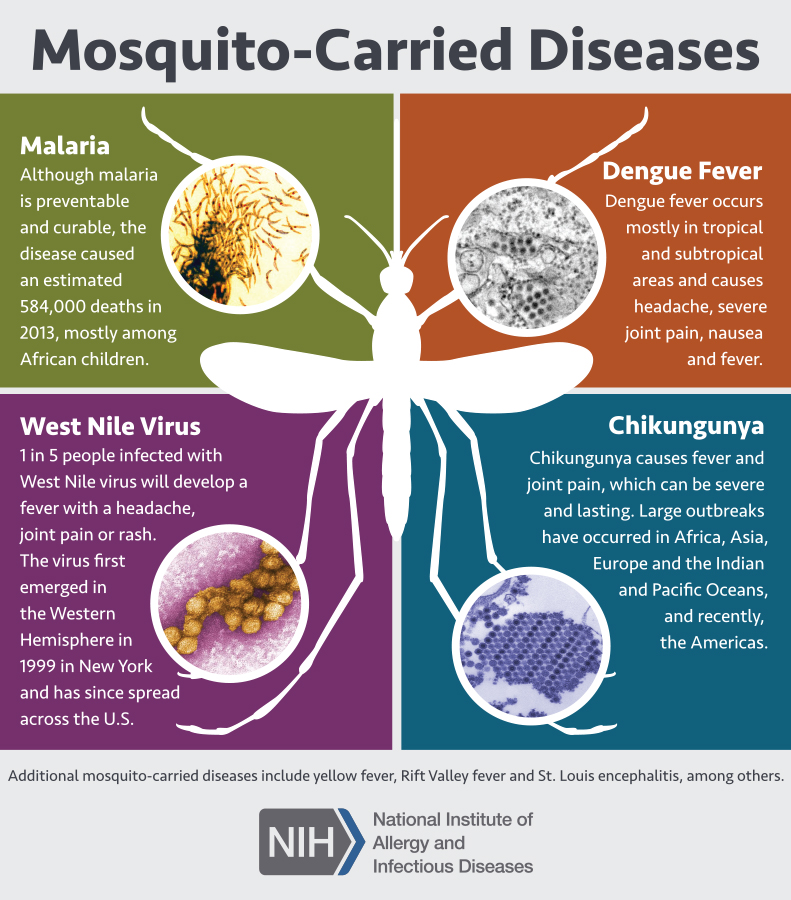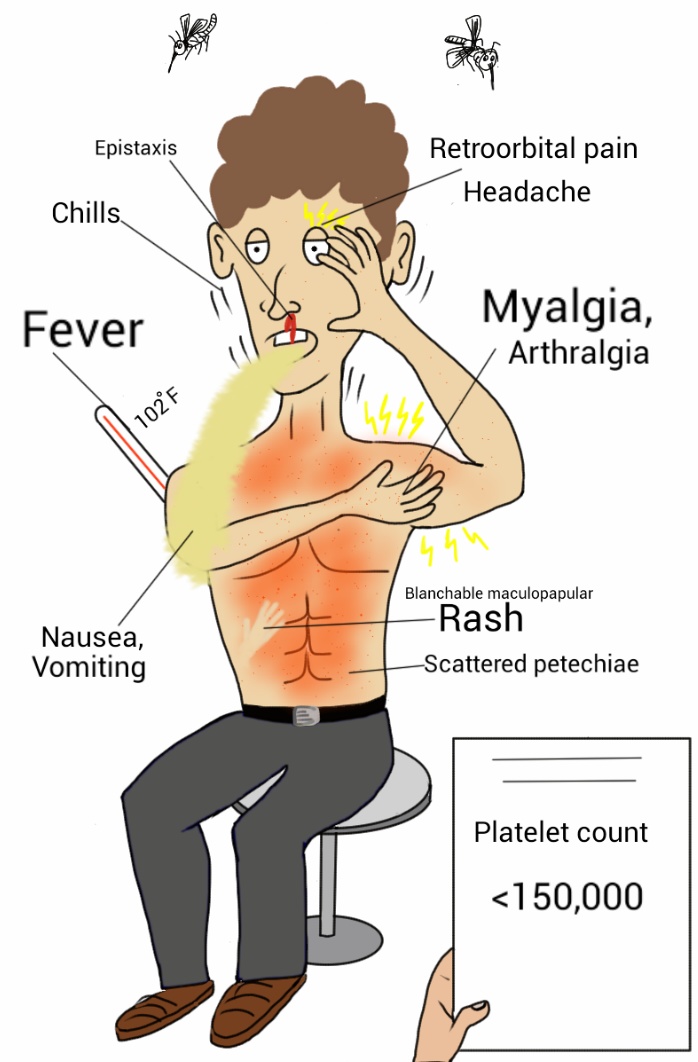Difference Between Chikungunya and Dengue
Chikungunya is a mosquito-borne viral illness with arthritis symptoms. Dengue is a mosquito-borne viral disease which has symptoms of pain, fever, and bleeding.
What is Chikungunya?
Definition:
Chikungunya is a disease caused by a virus spread by mosquitoes that causes arthritis type symptoms in people.
Mosquito vector and distribution of the disease:
This viral disease is transmitted by the bite of Aedes mosquitoes, particularly A. aegypti and to a lesser extent, A. albopictus. Chikungunya is quite widespread occurring in many parts of Asia, Africa, Central and South America. There is some occurrence of the illness in a few of the southern parts of the United States, namely in Texas and Florida.

Symptoms and mortality:
It causes symptoms similar to those of arthritis such as pain and swelling at joints. There is also often muscular pain present and the person may develop a headache. People with medical problems such as heart disease may have more severe symptoms as can older people (over 65) and newborn infants. In some cases, the death rate from this illness has been recorded to be about 1 in 1000 people who have the disease.
Diagnosis:
This illness may be suspected by the symptoms but is best diagnosed by testing for the presence of the genetic material, the RNA of the chikungunya alphavirus that causes it. In addition, a test for the presence of antibodies to chikungunya would indicate that a person has been exposed to the disease. The antibodies are detected by performing an enzyme-linked immunosorbent assays (ELISA) on a blood sample.
Treatment:
There is no drug that can be used to treat this condition and thus only the symptoms can be treated. Medication can be used to treat the fever and pain but dengue needs to first be eliminated as the cause before taking any pain medicine such as aspirin that could cause bleeding. There is also currently no vaccination against the chikungunya virus. In severe cases, anti-rheumatic medicines such as methotrexate may be given to patients.

What is Dengue?
Definition:
Dengue is a viral disease transmitted by Aedes mosquitoes that cause pain and some bleeding. Four strains of the virus have been identified as causing the illness, which is also known as dengue hemorrhagic fever (DHF).
Mosquito vector and distribution of the disease:
The main vector of dengue is the mosquito A. aegypti and sometimes A. albopictus. This illness is found in subtropical and tropical parts of the world such as parts of Africa, Asia, the Caribbean and various islands in the Pacific. It is also prevalent in parts of Central and South America.
Symptoms and mortality:
Symptoms include headache, fever, a rash, and sometimes also bleeding which can become severe in a few cases. Joint and muscle aches are common as is nausea and vomiting. The illness can be especially severe in children causing many to need to be put in the hospital for treatment. Plasma leaking from blood vessels into surrounding tissues can cause shock and may even lead to death without supportive treatment. If patients end up in shock from dengue they will have bad pain in the abdomen, low numbers of red blood cells and blood pressure. The mortality rate of dengue can vary from 1 to 20%, with the higher number being with patients who do not receive adequate treatment in a timely fashion.
Diagnosis:
The best way to diagnose dengue is to have a molecular test done in which the RNA of the dengue flavivirus is searched for. An ELISA can also be done to detect if any antibodies to dengue are present in the bloodstream of the person.
Treatment:
The best treatment is to address the symptoms of the illness. For instance, patients can take painkillers with acetaminophen to help with fever and aches. However, nonsteroidal anti-inflammatories and aspirin should not be taken because they increase the chances of bleeding in the body.
Difference Between Chikungunya and Dengue
Definition
Chikungunya is a virus transmitted by a mosquito that causes arthritic-like symptoms. Dengue is a virus transmitted by a mosquito that causes bleeding and arthritis symptoms.
Causative agent
Chikungunya is caused by an alphavirus, while dengue is caused by a flavivirus.
Proportion of infected who will become sick
In the case of chikungunya, about 75% of people who catch the virus will become sick. In the case of dengue, about 25% of people who catch the virus will become sick.
Incubation time
The incubation time of chikungunya is 3 days to one week. The incubation time of dengue is 4 days to one week.
Diagnosis
Chikungunya is best diagnosed by doing a molecular test looking for the RNA of the chikungunya virus and antibodies. Dengue is best diagnosed by doing a molecular test looking for the RNA of the dengue virus and antibodies.
Distribution
Chikungunya is found in Africa, Asia, Central and South America, Florida, and Texas. Dengue is found in tropical and subtropical countries of the Americas, Asia, and Africa.
Symptoms
The symptoms of chikungunya are painful joints and painful muscles, and fever. The symptoms of dengue are painful muscle, joints, fever, vomiting, and bleeding.
Hospitalization
It is less likely you will be hospitalized if you have chikungunya. It is more likely you will be hospitalized if you have dengue.
Mortality rate
The number of deaths from chikungunya is less than 1%, only about 1 in 1000. The number of deaths from dengue can vary from a low 1% to quite high at 20%.
Treatment
Chikungunya can be treated with aspirin, nonsteroidal anti-inflammatories, and acetaminophen. Dengue cannot be treated with aspirin or nonsteroidal anti-inflammatories but can be treated with aspirin.
Table Comparing Chikungunya and Dengue

Summary of Chikungunya Vs. Dengue
- Both chikungunya and dengue are viral diseases that are transmitted by Aedes mosquitoes.
- Dengue is more dangerous than chikungunya and has a higher rate of hospital admissions and deaths.
- Both chikungunya and dengue have similar symptoms of arthritis-like pain in the muscles and joints.
- Difference Between Rumination and Regurgitation - June 13, 2024
- Difference Between Pyelectasis and Hydronephrosis - June 4, 2024
- Difference Between Cellulitis and Erysipelas - June 1, 2024
Search DifferenceBetween.net :
Leave a Response
References :
[0]Image credit: https://commons.wikimedia.org/wiki/File:Dengue_features.JPG
[1]Image credit: https://commons.wikimedia.org/wiki/File:Mosquito-Carried_Diseases_(20565047612).jpg
[2]Centers for Disease Control and Prevention. “Chikungunya virus”. CDC. Centers for Disease Control and Prevention, 2018, https://www.cdc.gov/chikungunya/symptoms/index.html
[3]Ganesan, Vaishnavi, Bin Duan, and St Reid. "Chikungunya virus: Pathophysiology, mechanism, and modeling." Viruses 9.12 (2017): 368.
[4]Tuiskunen Bäck, Anne, and Åke Lundkvist. "Dengue viruses–an overview." Infection ecology & epidemiology 3.1 (2013): 19839.
